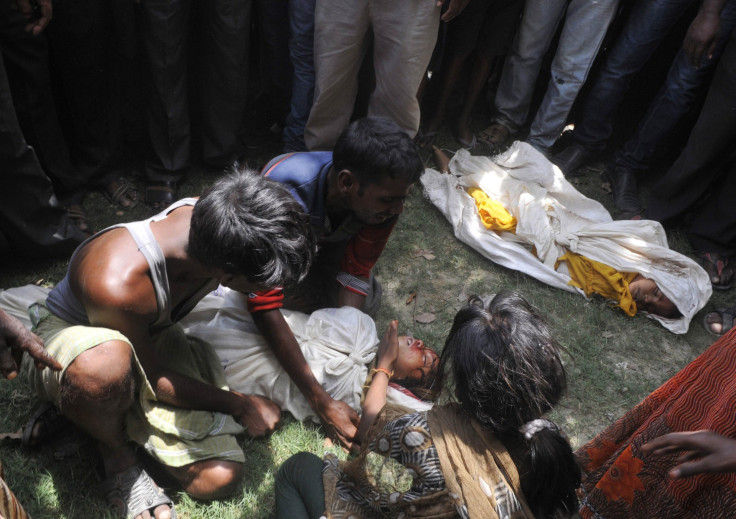India School Lunch Poisoning: Insecticide In Food Leaves At Least 23 Children Dead

Post-mortem results showed insecticide was in the food or cooking oil used to make a school meal that led to the deaths of at least 23 children in India, Patna Medical College Hospital superintendent Amarkant Jha Amar told the Associated Press. Amar said the results of a chemical analysis of the ingredients taken from the school were still pending.
Children, between the ages of five and 12, began to fall ill within minutes of eating the free dish at school in a village in the district of Chapra, in the poverty-stricken north-eastern state of Bihar, on Tuesday, a cook told Reuters from the hospital. Death arrived so quickly that some children died in their parents' arms while being taken to the hospital. Others reported that many of the young victims suffered deadly convulsions and smelled of poison.
The death toll has not been confirmed, but at least 23 children died after vomiting and convulsing from stomach cramps after eating on Tuesday, reported Reuters. Another local official told Reuters that 25 children had died. Doctors continue to struggle to save the poisoned children.
"The minute the children were brought in, we smelled this foul odor of organophosphorous," Vinod Mishra, a doctor at Patna Medical College Hospital, told Reuters. "It seemed as though it was coming out of their pores." The post-mortem results confirmed his suspicions.
The state government has offered grieving parents $3,350 in compensation, according to an ITV News report. The school in Mashrakh village provided free meals under the Mid-Day Meal Scheme.
Protests
Angry parents disinterred the hastily buried bodies of some of the victims and displayed them outside the school in protest, The Guardian reports. Demonstrators pelted a police station with stones, set ablaze buses, and chanted slogans against the state government, reports NBC. Meanwhile, thousands of schoolchildren refused to eat their free school meals Thursday, according to Agence France Presse.
India's free school meals program is one of the largest anywhere in the world, covering more than 100 million children. Prices of meat, fruit, or fresh vegetables have risen so high in the past few years, that parents in poorer families must rely on school lunches to ensure their children are given adequate nutrition. According to The Guardian, the program is "plagued by waste and corruption, and incidents of poisoning are common - though they are rarely this serious."
Parents first took the poisoned children to a local health center before they were transferred to local hospitals. India has no functioning ambulance service even in its major metropolises; rickshaws, or even carts, are often used to carry the ill or injured in rural areas.
A villager, Ram Bachan Rai, accused local officials of delaying transportation, which he said had caused the deaths of many children. According to Abhijeet Sinha, a senior government official, two children had died even before they reached the local clinic, with seven more dead before they could be brought to the nearest hospital.
School meals in India are provided by contractors, many of whom use substandard ingredients and pay off local officials. Grain purchased by the government is often poorly stored. A senior government health official in Delhi said one possibility for this accident was that an ingredient had been stored too close to dangerous chemicals. "Washing before cooking would have made no difference," he told The Guardian.
Investigation
Police have been searching for the principal of the school, who cannot be found. Local media reported that the school's food was supplied by the principal's husband, who operates a store in the village. Police said there were too many different versions of what happened at the school to make arrests. "We have made no arrests so far as we are waiting for forensic reports which will help us piece together the entire investigation," Sujit Kumar, superintendent of police in Chapra, told Reuters. "We have circumstantial evidence but the key to the investigation is the headmistress who is absconding." He added that the police had been unsuccessful in finding her.
School cook Manju Devi, whose own three children were reportedly among those sickened, told Reuters that she had fallen ill after eating the lunch. When asked if she had prepared the meal, her mother interrupted, Reuters reports, saying: "No! She had nothing to do with the meal that day, another cook had made the meal that day. She wasn't a part of it."
P.K. Shahi, Bihar's education minister, said on Wednesday that the headmistress had been dismissed because of this incident, although she has not yet given her own account of what happened. "In spite of the cook's complaint (over the smell of cooking oil used for the food), the headmistress insisted on its use and the cook made the food. The children had also complained about the food to the cook," said Shahi to Reuters. The news service also reported the meal was a potato curry and rice, while local reports said it was rice with soybeans and lentils.
Published by Medicaldaily.com



























